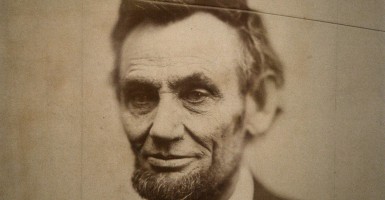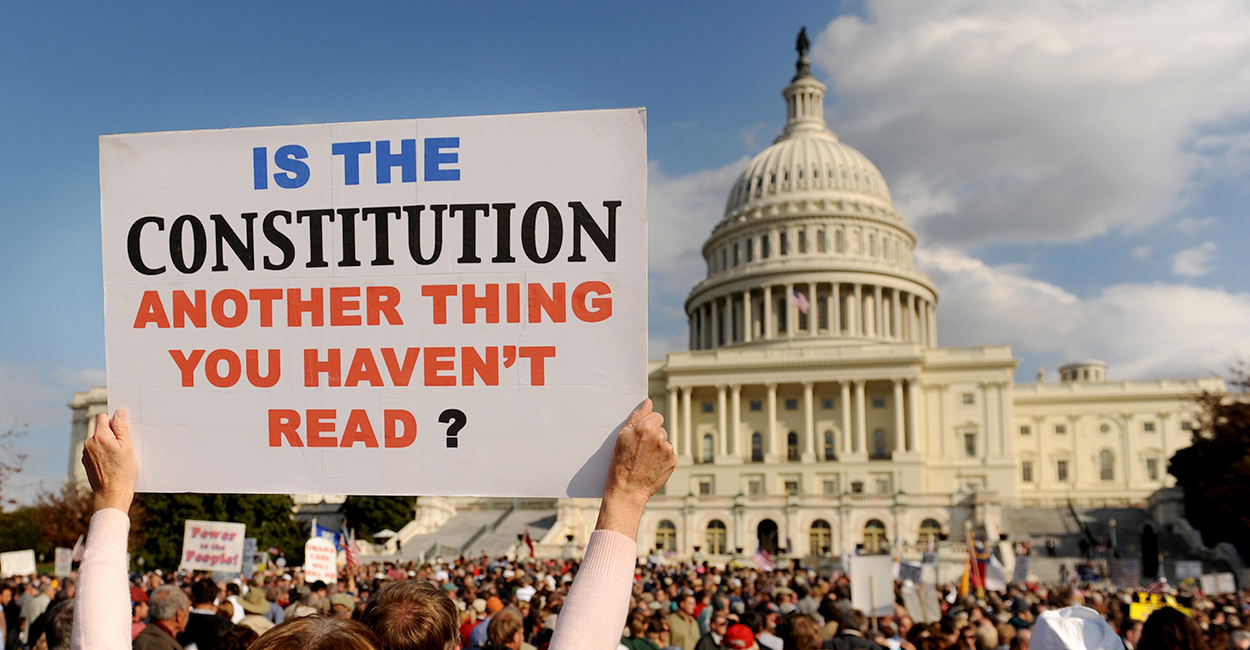As America observes the 150th anniversary of the assassination of Abraham Lincoln, we find that this great American’s legacy is as much a source of division as of unity. Lincoln is the first and greatest of America’s Republican presidents. Nevertheless, some voices on the contemporary left claim that the Republican Party no longer deserves to call itself the party of Lincoln.
Lincoln, after all, believed in an expansive exercise of the national power (at least by the standards of his day), while the modern Republican Party says it is more concerned with limiting the reach of the federal government. On this view, Lincoln was more of a progressive than a conservative.
The contemporary left also seeks—at least implicitly—to enlist Lincoln in its effort to transform American society. There are some comparisons for them to exploit. Lincoln headed a great transformation of American society in his own day: the abolition of slavery. The contemporary left is now pressing hard for a great transformation of American society in our own day: the redefinition of marriage. Lincoln’s statesmanship was in the service of the great and fundamental American ideas of freedom and equality. Today’s left campaigns for a redefinition of marriage, claiming our commitment to freedom and equality requires this innovation.
Moreover, today’s left contends that opposition to same-sex marriage is the moral equivalent of racism, an irrational bigotry that unjustly curtails the rights of others. They thus tacitly link their cause to that of Lincoln, whose political career was dedicated to resisting a great injustice committed in the name of racism: slavery.
These similarities, however, are misleading. The contemporary left’s campaign to redefine marriage is actually guided by principles that are incompatible with those that informed Lincoln’s thought and statesmanship. It is worth reviewing the difference because Lincoln’s principles are essential to maintaining our civilization, and the left’s rejection of them is a threat to our civilization.
1. Abraham Lincoln Was Charitable to People Who Disagreed With Him
First, there is a striking difference between the moderation usually characteristic of Lincoln’s political rhetoric and the intemperance of the political rhetoric commonly used by the left in its advocacy of same-sex marriage.
The proponents of same-sex marriage often denounce its opponents in the most strident terms that our political discourse affords: as “bigots” and “haters.” Those who seek same-sex marriage believe that its absence is an injustice. They would surely concede, however, that slavery was a far greater injustice. It is instructive, then, to note that Lincoln spent a large portion of his public life tenaciously pressing a fundamental moral and political critique of slavery, but without ever denouncing slaveholders as evil.
On the contrary, Lincoln admonished his fellow northern opponents of slavery that they should not pride themselves on a supposed moral superiority to slaveholders, because they would probably have thought and acted much like the Southerners if they, too, had been born and raised in a slaveholding society.
Jessica Jess Dooley fired after threatening to burn down #memoriespizza http://t.co/LjMYtQHLkS #tcot #tlot pic.twitter.com/fAJKTr4atE
— ???(•_•) (@exposeliberals) April 24, 2015
In arguing in this manner, Lincoln was not just being generous, although he was certainly a generous-minded man. He was also being a responsible statesman. He understood that while deeply divisive questions must be debated in a self-governing society, the tone of that debate should not cause some Americans to despise their fellow citizens, no matter how wrong the former thought the latter might be. Fostering such disdain was not only unjust, but also imprudent, since a healthy country requires mutual affection among its citizens and not mutual animosities.
2. Abraham Lincoln Upheld Natural Rights; Liberals Reject Them
Second, the kinds of ideas on which Lincoln relied in making his case against slavery were very different from the kinds of ideas to which the contemporary left uses in contending for same-sex marriage. Same-sex marriage advocates present it as the next great stage of social and moral progress. They explicitly or implicitly rely on notions of history as an intelligible and progressive process, as when they suggest their opponents are “on the wrong side of history.”
In contrast, Lincoln did not argue against slavery on the basis of such concepts as “history” and “progress”—although he did once suggest that America’s growing disregard for the principles of the Declaration of Independence showed a lamentable “progress” in “degeneracy.”
Lincoln’s statesmanship was based on the assumption that rational persuasion is possible, if admittedly difficult.
Instead, Lincoln made his argument on the basis of the natural rights philosophy that informed the American founding and was given memorable public expression in the Declaration of Independence. Lincoln followed the Declaration in accepting eternal principles of justice rooted in the nature of things, accessible in principle by reason to human beings in all places and at all times—in the words of the Declaration, “self-evident” truths rooted in “the laws of nature and nature’s God.”
The philosophic substance of Lincoln’s arguments no doubt played a role in sustaining the moderation of his rhetoric. Lincoln believed in a common ground of nature and reason, on which all human beings could argue with each other in moral terms everyone could understand. Lincoln’s statesmanship, in other words, was based on the assumption that rational persuasion is possible, if admittedly difficult.
In contrast, appeals to progress and history tend to exclude the possibility of persuasion. The left describes its opponents as being on the “wrong side of history.” The left’s opponents, however, do not think this of themselves. For the most part, indeed, they do not even recognize “history” as an intelligible standard by which human beings can evaluate the validity of their moral and political opinions.
They are instead informed—like Lincoln—by belief in permanent principles such as natural law and natural rights, or by a respect for tradition, for the ancient and universal understanding of marriage as a union between a man and a woman. In such a context, the judgment that one’s opponents are “on the wrong side of history” is not so much a conclusion that can be defended by arguments as a pronouncement that can neither be supported nor assailed by reasons that can be understood by both sides to the dispute. It is more an assertion of will. Small wonder that such an assertion tries to sustain itself—and to create in onlookers the appearance of objective validity—by substituting moralistic denunciation for moral argumentation.
3. Abraham Lincoln Fought to Restore America’s Founding Ideals
Third, as the argument above implies, Lincoln’s thinking about the problem of slavery was guided by the moral consensus of the American founding, or by the moral identity of the nation at its origins. Lincoln’s efforts to restrain, and eventually to eradicate, slavery were essentially conservative in their character, because they sought to restore a proper respect for the principles the founding generation held.
Lincoln knew, of course, that many of the founders had held slaves, and that they tolerated slavery in many of the states and gave it certain protections under the Constitution. Nevertheless, Lincoln also understood that the majority of the founding generation acknowledged that slavery was wrong, that it was inconsistent with the principles the founders asserted and were trying to live up to. The only argument for slavery that the founders ever acknowledged, Lincoln argued, was the argument from “necessity”—the necessity imposed by being born into a country with slavery as an established institution.
Submitting to this necessity, however, was compatible with recognizing the evil of slavery and trying to set it on the “course of its ultimate extinction.” It is true that a later generation of Southerners came to defend slavery not as a necessary evil to eradicate as soon as practicable but a positive good to be preserved forever. Lincoln, however, viewed the spread of this and similar opinions, again, as a sign of “degeneracy”—or deviation from a founding that had been good in its essential principles.
Contemporary progressives, on the other hand, cannot claim that the quest for same-sex marriage is an effort to restore the nation’s original, founding-era understanding of what marriage is. The definition of marriage as a union between a man and a woman, for the purposes of mutual support and the procreation of children, was absolutely uncontroversial among the founders, as it has been for most of human history in all civilizations of which we have knowledge.
The founders did not merely tolerate this supposedly too-limited conception of marriage as a necessary evil. They did not take steps to set it on the course of its ultimate extinction, to be replaced by a more expansive and supposedly more just definition. Such thinking never occurred to them and would have been rejected by them as madness if someone had suggested it.
Whatever else may be said about the quest for same-sex marriage, then, it is a demand not for restoration but innovation. It is not an effort to return to the founders’ understanding of a fundamental institution, but an effort to replace that understanding.
4. Abraham Lincoln Didn’t Write Things Into the Constitution
Fourth and finally, Lincoln respected the Constitution as having a determinable meaning distinct from his own moral convictions. From the time he became president, ardent abolitionists urged Lincoln to wield the executive power with a view to destroying slavery. He refused to do so on the ground that the Constitution gave the government of the United States no power to forbid slavery where it already existed, much less a unilateral power of the president to do so by executive decree.
The Constitution, after all, did not name slavery explicitly to delegate a federal power to abolish it. It only acknowledged slavery indirectly to provide it certain limited protections in the states where it already existed. Accordingly, Lincoln never used the executive power against slavery until he was convinced that doing so was a necessary war measure, and then only did it to the extent that it could be justified as such.
We are now told that the Constitution requires this transformation of marriage. This procedure turns the Constitution into an expression of the moral aspirations of whatever faction can prevail.
Lincoln held to this conception to the end of his political career, which is why he worked to secure the passage of the 13th Amendment, which added a prohibition of slavery to the Constitution—a procedure that would have been pointless if Lincoln had been willing to invent or discover such a principle in the Constitution as had existed prior to the 13th Amendment.
In contrast, those on the contemporary left promoting same-sex marriage draw no distinction between their moral aims and the Constitution. They argue as if same-sex marriage is self-evidently right, and that it therefore must be required by the Constitution.
The Constitution says nothing about marriage. The provisions to which the legal architects of same-sex marriage appeal—in the 14th Amendment—were written and ratified by people who had no intention to change the definition of marriage, and have been lived under by generations of people who never believed that they involved any such principle.
Nevertheless, we are now told that the Constitution requires this transformation of marriage. This procedure turns the Constitution into an expression of the moral aspirations of whatever faction can prevail, rather than a commonly respected set of fundamental legal principles on which citizens of differing moral and political views can agree.
It is worth noting here that the contemporary left seeks this redefinition of the Constitution through the judicial power. Here, again, they seek what Lincoln would not, and what he in fact condemned.
In his first Inaugural Address, Lincoln noted that “if the policy of the Government upon vital questions affecting the whole people is to be irrevocably fixed by decisions of the Supreme Court, the instant they are made in ordinary litigation between parties in personal actions, the people will have ceased to be their own rulers, having to that extent practically resigned their Government into the hands of that eminent tribunal.”
Needless to say, the definition of marriage, or the authority of our legislative institutions to define it as they think best, is a policy matter involving a vital question affecting the whole people. On Lincoln’s view, the effort to redefine marriage through a case relying on a legal argument not based on any express words of the Constitution would be inconsistent not only with respect for the Constitution but also for the people’s right to self-government.
It’s Not so Much About Gay Marriage as Losing Self-Government
None of this is to say, by the way, that fidelity to Lincolnian statesmanship would require the country to ignore or belittle the just aspirations of gay Americans. As opponents of same-sex marriage have often argued, those aspirations can be met by changes in the law that do not redefine marriage. And even if those aspirations did require redefining marriage, that aim would not require the use of the aforementioned problematic arguments and tactics that they have embraced and that Lincoln avoided.
Beyond the vital question of the definition of marriage, why does any of this matter? Lincoln’s political thought and statesmanship were always careful to foster respect for the principles necessary to preserve the character of our civilization: candid and forceful moral argument without embittering moralistic denunciation, appeal to permanent principles of natural right accessible to human reason and therefore offering the possibility of rational persuasion, a desire to preserve the moral inheritance of the founding, respect for the Constitution as a rule of law, and respect for the right of the people to govern themselves.
The contemporary left is seeking to achieve its goals in ways that undermine all of these essential principles. This should be a matter of concern to all Americans, regardless of their position on the particular goals—such as same-sex marriage—the left is seeking.
Originally published in The Federalist


























